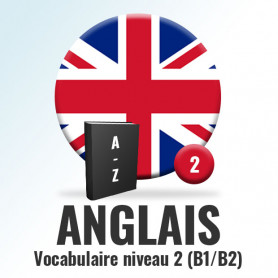
Formation Reflex’English – Level 2
Objectifs pédagogiques
Reflex’English Level 2 s’adresse aux apprenants ayant validé les compétences du niveau débutant. Il est également recommandé pour ceux qui souhaitent réviser ou consolider les connaissances abordées en niveau intermédiaire.
Reflex’English Level 2 permet d’atteindre le niveau B1/B2 du CECRL, il est composé de 24 leçons d’apprentissage et de 6 leçons de test, avec de nombreuses animations de situations, de grammaire et de vocabulaire. Parmi les objectifs de ce niveau : tenir une conversation simple sur des sujets liés au travail, à l’école, aux loisirs, faire face à des situations au cours d’un voyage dans un pays anglophone, s’exprimer à l’oral et à l’écrit de manière simple sur ses expériences et ses ambitions, formuler de courtes explications ou justifications relatives à un projet ou une opinion.
Prérequis
Aucun
Avoir le Niveau CECRL A1/A2.
Prérequis technique
• Navigateur web : Internet Explorer, Chrome, Firefox, Safari
• Système d’exploitation : Mac ou PC, smartphone
Temps de formation
Modalités d'évaluation
Quizz interactif en ligne avec certification TOEIC
Quizz interactif en ligne
Certification ENI en ligne avec e-surveillance
Les modalités des Certifications Bureautiques sont uniques :
l’examen de certification s’appuie sur une solution qui permet au candidat de manipuler directement dans le logiciel. Les compétences sont ainsi réellement évaluées et validées.
Technologie
• HTML5
• Norme SCORM
Modalités d'accès
14 jours après signature de la convention
Situation d’handicap :
formation accessible aux PSH , veuillez nous contacter pour étudier votre demande et les besoins de compensation
Méthodologie mobilisée
30 Modules comprenant de multiples jeux‐exercices
interactifs et stimulants.
24 leçons d’apprentissage
6 leçons de tests
A partir de
Pack Basic
-
90 jours d'accès à la plateforme
-
Accompagnement Asynchrone
-
Certification officielle incluse
-
Accès depuis tous vos appareils
-
Assistance sous 48H maximum
-
Coaching personnalisé
Pack Essentiel
-
90 jours d'accès à la plateforme
-
Accompagnement Asynchrone
-
Certification officielle incluse
-
Accès depuis tous vos appareils
-
Assistance sous 48H maximum
-
2H de Coaching personnalisé
Pack Avancé
-
90 jours d'accès à la plateforme
-
Accompagnement Asynchrone
-
Certification officielle incluse
-
Accès depuis tous vos appareils
-
Assistance sous 48H maximum
-
4H de Coaching personnalisé
Commencez à acquérir de nouvelles connaissances et expériences, ensemble !
-
Lesson 01 ‐ Janice’s interview: Part 1
• Useful questions
• “To be” in the simple present
• “To have” in the simple present
• Some prepositions: in, on, at or to?
• Adverbs of frequency
• Wh‐ question words
• Janice’s interview
• Review of Beginner Level -
Lesson 02 ‐ Janice’s interview: Part 2
• Some or any
• Comparative form
• Superlative form
• Possessive adjectives
• Possessive pronouns
• Prepositions of space
• Janice’s interview
• Review of Beginner Level -
Lesson 03 ‐ What do you do for a living?
• Asking and saying one’s job
• Asking questions in the simple present
• “To be” and affirmative short answers
• “To be” and negative short answers
• Simple present
• Jobs
• Job‐related verbs -
Lesson 05 ‐ Test Lessons 1 to 4
• Review and Test of Lessons 1 to 4
-
Lesson 05 ‐ Test Lessons 1 to 4
• Review and Test of Lessons 1 to 4
-
Lesson 06 ‐ What did you do yesterday?
• The simple past tense
• “To do” in the simple past
• “To be” in the simple past
• Simple past: regular verbs
• Simple past: irregular verbs
• Phrases with “to have”
• “To do” vs. “to make” -
Lesson 07 ‐ A short story: Slim Johnson robbed a bank
• Simple past: some regular verbs
• Simple past: some irregular verbs
• Simple past: asking questions
• A short story -
Lesson 08 ‐ What are you doing, Pete?
• Present participles
• The present continuous
• The present continuous: use
• The present continuous: questions with prepositions
• The present continuous: particular cases
• Questions tags
• Sense verbs
• Around “to think”
• Questions with why
• Around “to feel” and “to get” -
Lesson 09 ‐ It used to be different back then
• Structures with “used to”
• “Used to” and other tenses
• Past participles: regular and irregular verbs
• Present perfect
• “Such” or “such a”
• “To be used to”, “to be getting used to”
• Around “the sun”
• Around “agriculture”
• Comparing -
Lesson 10 ‐ Test Lessons 6 to 9
• Review and Test of Lessons 6 to 9
-
Lesson 11 ‐ How long ago was that?
• Since, for and ago
• Adverbs of place ending in ‐where
• The present perfect simple
• The past continuous
• The present perfect continuous
• That’s/It’s + adjective/noun + infinitive
• Interjections and onomatopoeia
• At the doctor’s
• At the chemist’s fine -
Lesson 12 ‐ What do you enjoy doing?
• Expressing likes and dislikes
• Likes and dislikes followed by verbs + ‐ing
• Putting nuances in likes and dislikes
• To look forward to
• Either / or, neither / nor, not / either
• “To look” or “to watch”
• “So do I”, “neither do I », “I do”, “I don’t”
• All, every, each
Spare time
Around “spare”
In the garden
Some hobbies and interests
Household chores
Fish ‘n’ chips -
Lesson 13 ‐ What are you going to do?
• Pronouncing the letter “L”
• Talking about the future
• The future simple with “will”
• The near future with “be going to”
• Ever, never
• Type 1 conditional: the real future
• The verb “to explain”
• Modal verbs
• Cultural activities
• Legal system -
Lesson 14 ‐ If I could, I’d go and live in Japan
• The present conditional
• Type 2 conditional
• Hypotheses with “what if” + future or conditional
• Still
• Expressing regrets
• Reflexive pronouns
• Making suggestions
• What would you do?
• Talking about fear
• Quantifiers: talking about parts
• Around “life” e -
Lesson 15 ‐ Test Lessons 11 to 14
Review and Test of Lessons 11 to 14
-
Lesson 16 ‐ I need to make a phone call
• “To need”: modal and regular verb
• “Won’t + infinitive”‐ refusal to work
• Must or have to?
• The telephone
• Using the phone
• Town facilities
• To pay, to pay for -
Lesson 17 ‐ Dealing with phone conversations
• « To work” + prepositions
• Phone phrases
• Phone conversations
• Organizational chart and positions
• Company departments -
Lesson 18 ‐ My home
• Irregular and regular verbs (GB) ≠ (US)
• Present perfect and past simple (GB) ≠ (US)
• Phrases with “to have” or “to take”
• Phrases with “to have” or “to have got”
• Different prepositions
• “Like” or “as
• Writing dates
• Giving advice with “had better”
• Words ending in a vowel + ‐L
• Spelling differences
• Completely different words -
Lesson 19 ‐ Thanksgiving: an American tradition
• The passive voice (past, present, future)
• Compound adjectives
• The word “meat”: both countable and uncountable
• General knowledge: the USA
• Thanksgiving
• Holiday (GB) / Vacation (US)
• Animals and meat
• A song about New York -
Lesson 20 ‐ Test Lessons 16 to 19
• Review and Test of Lessons 14 to 19
-
Lesson 21 ‐ You didn’t tell her, did you?
• Questions tags
Informal contractions
• Around “secrets and suspicions”
• Around “mistake”
• Around “back”
• Around ”unemployment”
• “On earth”, “the hell” -
Lesson 22 ‐ Clothes and accessories
• Reported speech
• Present perfect vs. simple past
• Despite, in spite of, although, even though
• Both or neither ,TV news
• Talking about injuries
• Around “to let”
• Verbs beginning with “over”
• Around “sport” -
Lesson 23 ‐ UFO report
• Adjectives ending in ‐ish
• “Like” or “as”?
• Nuancing the size
• Expressing certainty
• Reported questions, requests and orders
• Outside news
• Around “hear”
• Around “fire brigade” -
Lesson 24 ‐ Weather and climate in the UK
• Talking about weather forecast
• Double comparative (the more…/the more…, the
less…/the less…)
• Weather idioms
• Weather and climate in the UK
• Around rain, clouds, cold, winds, temperature
• The compass rose
• Geography of the UK -
Lesson 25 ‐ Test Lessons 21 to 24
• Review and Test of Lessons 21 to 24
-
Lesson 26 ‐ Whose dog is it?
• Useful questions, order of adjectives
• Adverbs: « too » and « enough »
• Vague expressions
• Question tags: particular case
• Contractions of verbs
• Made of, from, out of, with
• Utility and functions: passive voice structures
• Passive voice with “to be made to do (something)”
• Periphrases
Describing things
• Materials -
Lesson 27 ‐ Describing people
• Character and behaviour: opposed adjectives
• Compound adjectives
• Useful verbs: things you can do with your mouth
• Talking about character and behaviour
• Talking about age
• Around the face
• Talking about physical appearance
• Talking about height
• Talking about weight
Describing hair
• Talking about complexion and skin -
Lesson 28 ‐ What would you have done?
• Past conditional
• Type III conditional: formation, use
• Type III conditional with modal verbs
• Type III conditional with “even if”
• To be able, can / could
• Expressing regrets in the past
• Conditional types: review
• At the meeting
• Around “to miss”, around “to bother” -
Lesson 29 ‐ Writing emails and letters
• Around “to write”
• Around emails
• Layout of emails
• Writing and sending an email
• Around mails
• Layout of a formal letter
• Opening salutations, complimentary closes
• The message of the letter -
Lesson 30 ‐ Test Lessons 26 to 29
Review and Test of Lessons 26 to 29


